Best sound card UK
Which is the best sound card in 2024?
VIEW OFFERBest of 2024: Find the right sound card in the UK
If you consider yourself an audiophile, a good sound card is one of most important parts of your PC. While more expensive systems usually come with good sound cards, the cheaper options are often quite poor, which is disappointing if you enjoy playing video games with headphones or a sound system. So, if you are lacking in the sound quality department, be sure to look for a great sound card to remedy the problem. To help you find the best sound cards for your PC, check out the buying guide below.
The 10 best sound cards in the UK (December 2024)
The bestseller list compares sound cards from multiple brands
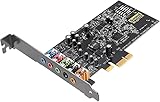
- Control: Convenient management at your fingertips.
- Surround: Single digital cable for immersive sound.
- Connectivity: Comprehensive options for all audio needs.
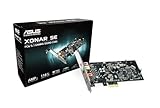
- Interface: Xonar Audio Center offers an intuitive, user-friendly interface.
- Clarity: 116dB SNR for hi-fidelity, immersive audio experience.
- Quality: 192kHz/24-bit, 5.1-channel playback, and 300ohm amp for bass and detailed sound.
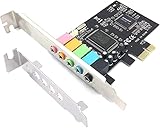
- Performance: 16-bit decoder and supports 32/64-bit audio processing, recording, and playback.
- Compatibility: Low profile bracket for fitting in 2U desktop cases.
- Cinematic: 5.1 3D stereo sound for an immersive entertainment experience.
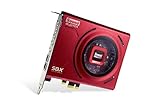
- Surround: Immersive surround sound enhances gaming focus.
- Amplifier: Drives studio-grade headphones effortlessly.
- Clarity: Up to 116 dB SNR, 24-bit / 192 kHz audio quality.
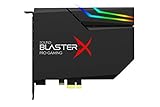
- Amplification: Includes Xamp, a custom-designed discrete headphone amplifier.
- Quality: Features SABRE32 PCI-e DAC for 32-bit/384 kHz playback.
- Support: Supports Dolby Digital Live and DTS for high-quality audio delivery.
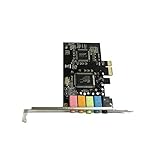
- Audio: Enjoy compelling 3D audio and 4-channel sound on multiple speaker series.
- Compatibility: Supports WIN2000/XP/VISTA/win7/linux for versatile use across different systems.
- Surround: Provides 5.1 3D stereo surrounding sound, enhancing your cinematic entertainment experience.
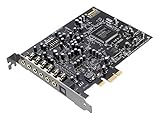
- Inputs: Dual microphone inputs.
- Latency: Super low-latency audio recordings.
- Chipset: E-MU chipset for advanced effects processing.
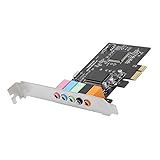
- Connectivity: Supports SPK1, SPK2, SPK3, line input, and microphone input.
- Audio Quality: 32bit PCI Express x1 slot provides high audio fidelity.
- Compatibility: Full support for Sound Blaster and DirectSound.

- Control: Sonic Studio for intuitive audio management.
- Clarity: 110dB SNR ESS DAC for high-quality sound.
- Quality: 192kHz/24-bit Hi-Res audio and 7.1-channel support.
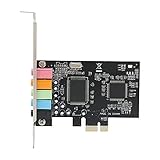
- Quality: Eliminates noise balance when turning off/on the computer, ensuring clear sound.
- Multichannel: 6-channel surround sound for home theater and large-scale 3D games.
- Compatibility: Supports Windows 7/Vista/XP, 32/64bit with PCIExpress slots.
Affiliate link: We are a participant of the Amazon Associates Program. If you buy a product through this link we might earn a small commission from Amazon at no extra charge for you. As an Amazon Associate we earn from qualifying purchases.
- Read the definitive sound card buying guide
- View the sound card picks and see how they rank in the top list
sound card buying guide
Do you want to buy a good sound card? This is all you need to know.
A short explanation: What are sound cards?
A sound card, also called audio card, is an internal expansion card that provides the input and output of audio signals to and from a computer under the control of computer programs. If you want to listen to music using your computer’s speakers or headphones, you need a sound card to produce the audio signals. Additionally, microphones or external audio devices like synths or controllers need to be connected to the sound card for recording. So basically, all integrated or external computers require a good sound card.
What are the benefits of good sound cards?
Most computers and laptops already have a sound card built in, so you only need to buy a new one if you require higher quality sound. For example, if you are a audiophile that demands the highest quality sound from their computer, then a sound card is s great investment. Not only does a sound card provide high quality audio, but it can is necessary to use to record audio from your computer. Video game streamers often require sound cards to record audio from the game and their microphone.
How to choose the best sound card in 2024?
As it’s a complex piece of hardware, finding the best sound card isn’t always easy. There are so many technical specifications to consider that it’s quite difficult to narrow it down. However, knowing what to look for can make the process much easier. To find a great soundcard be sure to consider some of the following:
- Connectivity: Sound cards connect to a motherboard in a computer tower. The expansion slot used will determine the connectivity of the sound card, which will be either PCI or PCI-E. Be sure to check your motherboard to confirm the right connectivity, with PCI-E being the standard option on most new motherboards.
- Analog-to-Digital Conversion (ADC): The ADC quality of a sound card is vital if you plan on recording audio. Look at the maximum bit-depth and sample rate for the ADC, with a higher rate resulting in better-quality sound, i.e. 24-bit, 96kHz is superior to 16-bit, 48 kHz. Also, consider whether you need balanced inputs for any recording equipment you have. This requires a higher-quality sound card.
- Digital-to-Analog Conversion (DAC): The better DAC a sound card has, the crisper, and clearer output audio it provides. Much like with ADC, check the sample rate and bit depth of the sound card’s output audio.
Which types of sound cards are available to buy in the UK?
There are quite a few options to choose from when looking for a new sound card. While some are outdated, others offer different features so may be worth investing in.
- AC’97 Sound Card: The AC’97 sound card is quite outdated but can still be found on the used market. It’s a standard PCI sound card which offers the most basic audio inputs and outputs. This is still a worthwhile sound card if you are just looking for the standard features.
- HD Audio Sound Card: High-definition audio sound cards were first introduced in 2004 and quickly became standard across nearly all devices, including laptops, tablets, and most desktop computers. Unless your computer is over a decade old, it is unlikely that it will be compatible, but it’s worth checking regardless.
- Surround Sound Card: While not necessary, as most modern sound cards support surround sound, there are some cheap options that offer an easy way to install 5.1 or 7.1 audio outputs. This allows for far better surround sound for audio and video media, so is worthwhile sound card for any audiophiles.
